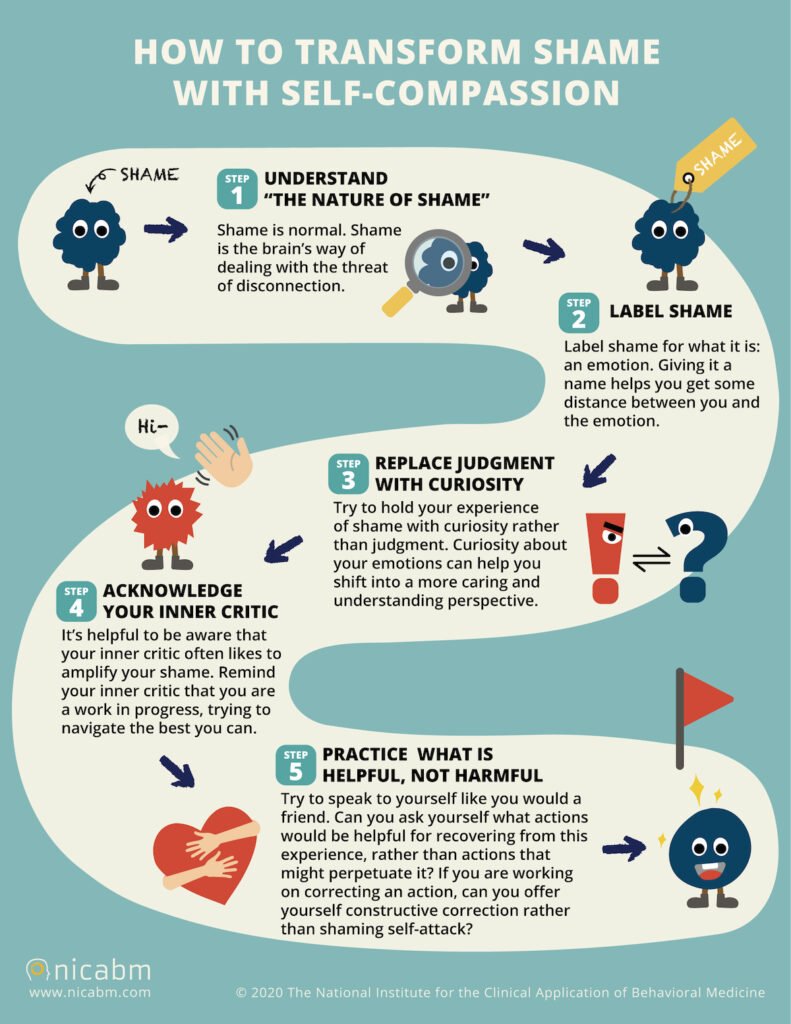
This isn’t the first time I’ve written about self-compassion. It also won’t be the last, because self-compassion is that important, including for shame and motivation. I’ve completed trainings in self compassion because I want my perfectionist self to be more self-compassionate and help my perfectionist clients cultivate more self-compassion, too.
What is self-compassion? On the simplest level, it’s turning compassion inwards when you make a mistake, fail at something, or are struggling — rather than being self-critical. On a more detailed level, self-compassion has three parts:
- Self-Kindness
- Common Humanity
- Mindfulness
When we’ve just screwed up, stuck our foot in our mouth, or are hurting because of something someone said to us, we deserve kindness, because we are human, and all humans screw up, say the wrong thing, and suffer sometimes. Mindfulness helps us be aware of what we’re doing and feeling, and of how we can give ourselves comfort.
What self-compassion is not is self-pity, laziness or indulgence. Showing yourself kindness is not the same as throwing yourself a pity party, nor is kindness a luxury afforded to a select few. And self-compassion doesn’t let you off the hook if you owe someone a heartfelt apology or made a mistake that you need to fix.
Self-compassion is not selfish, and it’s not just about ourselves. We are all interconnected, so showing ourselves compassion impacts everyone we come into contact with. If we never show ourselves compassion, we’ll run out of compassion to give to others. I find this ironic, because some of the kindest, most compassionate people I know have trouble turning that kindness and compassion towards themselves.
Related Post: Want to be healthier in 2023? Fire your inner drill sergeant.
Self-compassion is the antidote for shame
Most things have a polar opposite, and that’s true for self-compassion. The opposite of self-kindness is self-criticism, the opposite of common humanity is self-isolation, and the opposite of mindfulness is self-absorption. Those opposite characteristics of self-compassion — self-criticism, self-isolation, self-absorption — just happen to be qualities of shame.
In fact, shame and self-compassion often coexist in inverse proportions. The more self-compassion you show yourself, the less shame you experience, and vice versa.
Shame can feel isolating — as if you’re the only one who’s experienced it — but it’s a universal emotion. It’s also not a permanent emotion, even though once you’re falling into a shame spiral it may feel like you’ll never get out. As with all emotions, shame is transitory.
Shame is generally an innocent emotion that calls for kindness because it stems from the wish to be loved. From birth, we have the need to be loved because when somebody loves us, we will survive. We never give up this wish/need, even once we’re full-fledged adults who can take care of ourselves. Shame is the fear that something about us renders us unlovable. We all have the capacity for shame, and it was good for evolutionary reasons because it kept us in the group, which meant we didn’t have to go it alone when the sabertooth tiger came along.
When I took a training on Mindful Self-Compassion from self-compassion researchers Kristen Neff and Christopher Germer last year, Germer said that if you imagine a coin, shame is on one side and the need to be loved on the other. If we can see the need to be loved, it opens the door to compassion and calls for kindness. He talks more about self-compassion is an antidote to shame in this video:
How do we know when we’re feeling shame?
There are two types of shame:
- State shame, which comes and goes
- Trait shame, which we carry around all the time
State shame is fine, because we can show ourselves compassion, then take action if the trigger for the shame is something we did or said. Trait shame isn’t good at all — we develop it because we learned and internalized it based on how we’ve been treated by others, and from messages we pick up from society. Trait shame is not our fault.
(It’s ironic that people who SHOULD feel shame because of something they did don’t feel it, while people who shouldn’t feel shame do, and it’s usually not because of something they did — they feel it because they’ve been devalued.)
Shame is a “self-conscious” emotion. While guilt means, “I did a bad thing,” shame means, “I am a bad thing,” and then here comes the self-critical voice. Self-criticism is an attack on the self, and shame keeps us from living up to our potential. Shame is mostly invisible: it makes us go small, go silent, or go away. We become afraid to go into public because we don’t want those shameful aspects of ourself be revealed. And when we are in public, we may not feel free to be ourselves. We aren’t living fully.
In that training I mentioned, Germer said: “The more we understand about shame, the more it loses its grip,” and “Addressing with shame with self-compassion can be a transformative experience.”
There’s an exercise called “self-compassion break for shame,” and rather than write it out here, I recommend watching Germer lead the exercise in this video.
This infographic from the National Institute for the Clinical Application of Behavioral Medicine (NICABM) on transforming shame with self-compassion actually leads nicely into how to use self-compassion to motivate ourselves. (If you want a printable version, click on the link.)

Self-compassion is an effective motivator (Part 1)
Remember how I said self-compassion isn’t laziness? Self-compassion can also be motivating in a way that’s the opposite of the inner drill sergeant we often subject ourselves to. To see how this works, grab a pen and paper, then:
- Write down an unhelpful behavior you engage in that’s causing you some unhappiness, and that you would like to change. Try to pick one that is mild-to-moderate in terms of difficulty. (For example, are you going to bed late every night then finding it hard to get up in the morning and get to work on time? Are you not getting much movement in your day and you’re noticing that you’re feeling stiff and just sort of blah?)
- Write down how your inner critic expresses itself when you do this behavior. What word and tone does it use? If no words are coming to you, is there an image?
- Write down how it feels to receive this criticism, disapproval and judgement. How much distress has your inner caused you? Now, write a few words of kindness and compassion to the part of you that feels criticized.
- Get curious about your inner critic. Is there any way it may be trying to help you, maybe by protecting you or keeping you safe? If you come up with something, and it feels OK, try writing a few words of thanks to your inner critic or a few words of appreciation for its efforts to help, maybe recognizing that its intentions were good even if its words ended up not helping. If you don’t think your inner critic was actually trying to help (as is sometimes the case) then give yourself some compassion for how your inner critic has made you suffer in the past.
Self-compassion is an effective motivator (Part 2)
Now that you’ve gotten curious about your critical voice, and maybe gave it a “Thank you for your service, I can see you were trying to help, but I think I need to find different help,” can you find your inner compassionate voice?
If this feels hard, try thinking of the voice of a kind parent or a dear friend who is wise, caring, and understanding, who accepts you unconditionally and wants the best for you. This is your inner compassionate voice/part/self.
Try putting your hands over your heart (or somewhere else that feels soothing) and feel their warmth. Think about the behavior you’re trying to change. Repeat a phrase that reflects your inner compassionate voice. A few ideas are:
- “I love you and I don’t want you to suffer.”
- “I really care about you, and I want to do what I can to help you make this change.”
- “I’m always here for you to support you however you need.”
Then, when and if it feels OK, write a note to yourself in the voice of your compassionate self about the change you want to make that captures the feeling of being unconditionally loved and supported. What do you need to hear in order to move toward change?
There’s going to be suffering in our lives until the day we die, and some of this is because we make mistakes or have trouble changing habits. You could try to deal with this suffering by launching into what’s been called “the subtle aggression of self-improvement.” Or you could show yourself kindness. Learning to accept and even embrace your imperfections is a big shift in intention. In the words ofpsychotherapist Carl Rogers:
“The curious paradox is that when I accept myself just as I am, then I can change.”

Self-compassion is not a solution for all ills (but it helps)
We all deserve kindness and compassion from others. Self-compassion doesn’t make up for poor treatment from others — or for deeper injustices — but it is a way to give ourselves kindness whenever we need it, at the moment we need it.
If practicing mental self-compassion doesn’t feel safe for you, perhaps because of your upbringing, behavioral self-compassion may still feel safe. Behavioral self-compassion in daily life is doing the things you usually do to care for yourself. For example, drinking a cup of tea or coffee, going for a walk in the woods, gardening on a nice spring day, reading a good book, taking a shower or bath and delighting in the feel of the water on your skin, going to bed on time.
There are also somatic expressions of self-compassion. For the three parts of self-compassion, these look like:
- Mindfulness: Hold out your hands, palms up
- Common Humanity: Hug yourself
- Self-kindness: Place your hands on your heart
Looking specifically at somatic expressions of self-kindness, there are many ways we can show ourselves compassion through self-touch:
- Palms together (prayer position)
- Hand on heart
- Two overlapping hands on heart
- Fist on heart, covered by other hand (strength + tenderness)
- Hand on cheek
- Leaning cheek into hand
- Both hands cupping face
- Hands cupping head
- One hand on heart, other hand on belly
- Hands touching arms or legs
- Hands nestled (palm up) in lap

My go-to resources
If after reading the section above you’re rolling your eyes (which I did, too, once upon a time), I encourage you to just try it. Many of my clients have found these tangible expressions of self-kindness to be very helpful, and as an added bonus, you can do them pretty much anywhere, and even keep them secret.
(In this episode of the Ten Percent Happier podcast on “The Scientific Case for Self-Compassion,” Germer and host Dan Harris address how self-compassion can sometimes feel “cheesy.”)
One client found that self-compassionate touch helped when she was in a stressful meeting at work. (You know…those meetings where you’re thinking, “I can’t believe I have to work with some of these people.”) Placing her hands on her legs under the table in a kind gesture helped her get through. Other clients have felt calmed by placing a hand over their heart while they’re stopped in traffic gridlock. (That’s a perfect time to practice acceptance of the current moment, because nothing you do will make traffic go faster.)
To learn more about self-compassion, here are my favorite resources:
- “Self-Compassion: The Proven Power of Being Kind to Yourself,” and “Fierce Self-Compassion: How Women Can Harness Kindness to Speak Up, Claim Their Power, and Thrive,” both by Kristen Neff
- “The Mindful Path to Self-Compassion: Freeing Yourself From Destructive Thoughts and Emotions” by Christopher Germer.
- “The Mindful Self-Compassion Workbook: A Proven Way to Accept Yourself, Build Inner Strength, and Thrive” by both Neff and Germer.
- The Center for Mindful Self-Compassion), started by Neff and Germer.
This post contains Amazon Affiliate links. As an Amazon Associate I earn from qualifying purchases.
Disclaimer: All information provided here is of a general nature and is furnished only for educational purposes. This information is not to be taken as medical or other health advice pertaining to an individual’s specific health or medical condition. You agree that the use of this information is at your own risk.
Hi, I’m Carrie Dennett, MPH, RDN, a weight-inclusive registered dietitian, nutrition therapist and body image counselor. I offer compassionate, individualized care for adults of all ages, shapes, sizes and genders who want to break free from eating disorders, disordered eating or chronic dieting. If you need to learn how to manage IBS symptoms with food, or improve your nutrition and lifestyle habits to help manage a current health concern or simply support your overall health and well-being, I help people with that, too.
Need 1-on-1 help for your nutrition, eating, or body image concerns? Schedule a free 20-minute Discovery Call to talk about how I can help you and explore if we’re a good fit! I’m in-network with Regence BCBS, FirstChoice Health and Providence Health Plan, and can bill Blue Cross and/or Blue Shield insurances in many states. If I don’t take your insurance, I can help you seek reimbursement on your own. To learn more, explore my insurance and services areas page.
 Print This Post
Print This Post






